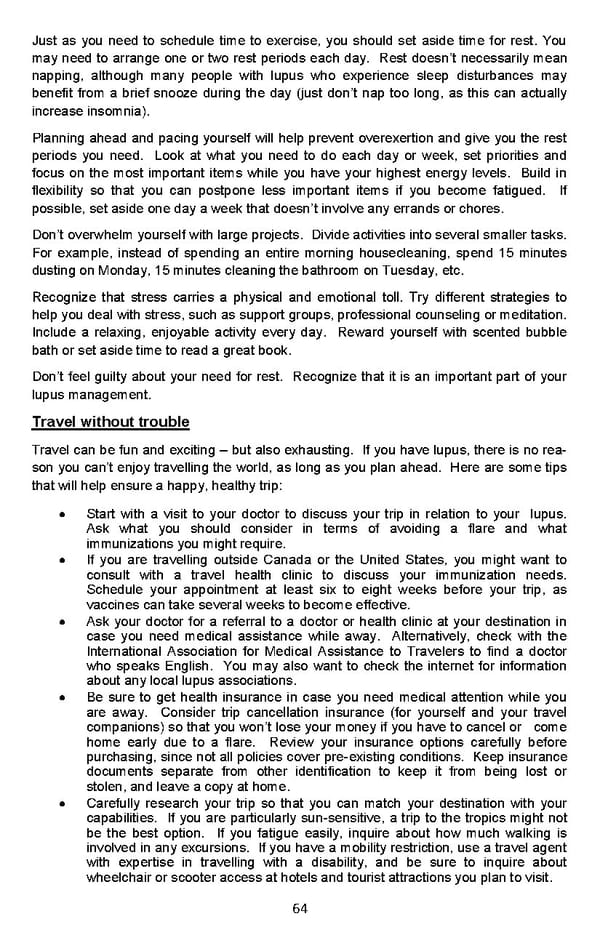Just as you need to schedule time to exercise, you should set aside time for rest. You may need to arrange one or two rest periods each day. Rest doesn’t necessarily mean napping, although many people with lupus who experience sleep disturbances may benefit from a brief snooze during the day (just don’t nap too long, as this can actually increase insomnia). Planning ahead and pacing yourself will help prevent overexertion and give you the rest periods you need. Look at what you need to do each day or week, set priorities and focus on the most important items while you have your highest energy levels. Build in flexibility so that you can postpone less important items if you become fatigued. If possible, set aside one day a week that doesn’t involve any errands or chores. Don’t overwhelm yourself with large projects. Divide activities into several smaller tasks. For example, instead of spending an entire morning housecleaning, spend 15 minutes dusting on Monday, 15 minutes cleaning the bathroom on Tuesday, etc. Recognize that stress carries a physical and emotional toll. Try different strategies to help you deal with stress, such as support groups, professional counseling or meditation. Include a relaxing, enjoyable activity every day. Reward yourself with scented bubble bath or set aside time to read a great book. Don’t feel guilty about your need for rest. Recognize that it is an important part of your lupus management. Travel without trouble Travel can be fun and exciting – but also exhausting. If you have lupus, there is no rea- son you can’t enjoy travelling the world, as long as you plan ahead. Here are some tips that will help ensure a happy, healthy trip: • Start with a visit to your doctor to discuss your trip in relation to your lupus. Ask what you should consider in terms of avoiding a flare and what immunizations you might require. • If you are travelling outside Canada or the United States, you might want to consult with a travel health clinic to discuss your immunization needs. Schedule your appointment at least six to eight weeks before your trip, as vaccines can take several weeks to become effective. • Ask your doctor for a referral to a doctor or health clinic at your destination in case you need medical assistance while away. Alternatively, check with the International Association for Medical Assistance to Travelers to find a doctor who speaks English. You may also want to check the internet for information about any local lupus associations. • Be sure to get health insurance in case you need medical attention while you are away. Consider trip cancellation insurance (for yourself and your travel companions) so that you won’t lose your money if you have to cancel or come home early due to a flare. Review your insurance options carefully before purchasing, since not all policies cover pre-existing conditions. Keep insurance documents separate from other identification to keep it from being lost or stolen, and leave a copy at home. • Carefully research your trip so that you can match your destination with your capabilities. If you are particularly sun-sensitive, a trip to the tropics might not be the best option. If you fatigue easily, inquire about how much walking is involved in any excursions. If you have a mobility restriction, use a travel agent with expertise in travelling with a disability, and be sure to inquire about wheelchair or scooter access at hotels and tourist attractions you plan to visit. 64
 Living Well With Lupus Facts Booklet Page 63 Page 65
Living Well With Lupus Facts Booklet Page 63 Page 65